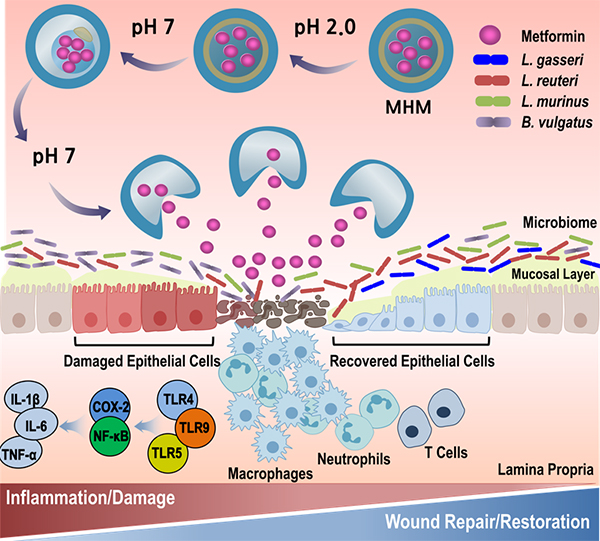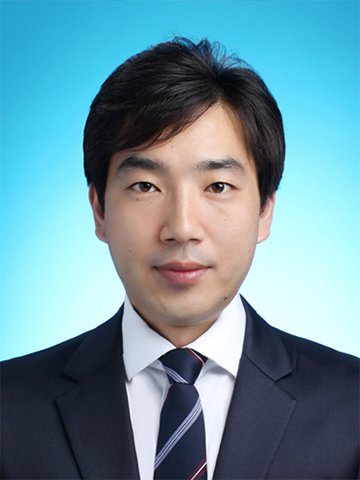커뮤니티
부경투데이
- 국립 부경대학교의 다양한 모습과 소식을 접하시면 부경대학교가 한번 더 가까워집니다.
| 당뇨병 치료제로 대장염 치료제 개발(Developed Metformin-Based Treatment for Colitis) | |||
| 작성자 | 대외협력과 | 작성일 | 2025-01-21 |
| 조회수 | 406 | ||
| 당뇨병 치료제로 대장염 치료제 개발(Developed Metformin-Based Treatment for Colitis) | |||||
 |
대외협력과 |  |
2025-01-21 |  |
406 |
국립부경대 이세중 교수팀, 메트포르민 기반 대장염 치료제 개발 ‘주목’
- 당뇨병 치료제의 대장염 치료 효과 확인

△ 메트포르민 캡슐의 대장 염증 부위 작용 모식도.
 국립부경대학교(총장 배상훈)는 스마트헬스케어학부 휴먼바이오융합전공 이세중 교수 연구팀이 염증성 대장염 치료와 장내 마이크로바이옴 개선에 효과적인 신개념 메트포르민(metformin) 캡슐을 개발했다고 발표했다.
국립부경대학교(총장 배상훈)는 스마트헬스케어학부 휴먼바이오융합전공 이세중 교수 연구팀이 염증성 대장염 치료와 장내 마이크로바이옴 개선에 효과적인 신개념 메트포르민(metformin) 캡슐을 개발했다고 발표했다.
이세중 교수는 영남대학교 최창형 교수와 공동 연구팀을 구성해 이번 연구 결과를 화학/약리학 국제학술지 <Journal of Controlled Release>(IF 10.5)’에 1월 발표했다.
공동 연구팀은 당뇨병 치료제로 널리 알려진 메트포르민을 3중막 구조의 하이드로겔 캡슐로 포장한 pH 적응형 경구 약물전달시스템을 개발했다. 이 시스템은 위의 산성 환경(pH 2)에서는 약물을 안정적으로 보호하면서도, 대장 염증 부위(pH 7)에서만 메트포르민을 특정적으로 방출하는 특징을 가진다.
이러한 특성을 통해 적은 약물 용량으로도 대장 내 생체이용률을 획기적으로 높여 염증성 대장염을 효과적으로 치료할 수 있음을 확인했다. 또 메트포르민이 전염증성 면역 반응을 조절하고, 장내 마이크로바이옴의 다양성과 풍부도를 개선할 수 있다는 점도 염증성 대장염 동물 모델에서 규명했다.
이세중 교수는 “염증성 대장염 환자는 식이 제한으로 인해 영양소 흡수에 어려움을 겪어 혈당 조절이 방해되고, 이는 제2형 당뇨병 발병 위험을 높이는 원인이 될 수 있다.”라면서, “메트포르민은 당뇨병 치료제로 잘 알려졌지만, 대장염 치료제로서의 잠재력은 아직 제대로 조명되지 않았다. 특히 경구 투여 시 위산 및 소화효소에 의해 약물이 분해돼 안정성과 생체이용률이 저하되는 문제를 해결하는데 이번 캡슐화 기술이 중요한 돌파구가 될 것.”이라고 강조했다.
이어 “이번 연구는 메트포르민의 새로운 약리적 가능성을 제시함과 동시에, 마이크로바이옴 개선과 난치성 대장염 치료를 위한 약물전달 기술의 중요한 사례가 될 것.”이라고 기대했다.
한편 이세중 교수는 이번 연구에 이어 첨단 마이크로캡슐 및 마이크로니들 기술을 활용해 특정 질환 부위에 표적화된 바이오의약품(줄기세포, 펩타이드, 항체)을 개발하고, 이를 통해 대사성, 만성, 난치성 질환을 치료하는 연구를 지속해서 진행하고, 스마트 헬스케어 분야의 맞춤형 인재 양성에도 힘쓸 계획이다. <부경투데이>
Professor Se-Jung Lee's Team at Pukyong National University Developed Metformin-Based Treatment for Colitis
Pukyong National University (President Sang-Hoon Bae) announced that the research team led by Professor Se-Jung Lee from the Department of Smart Healthcare Convergence, Human Bio-Convergence Major, has developed an innovative metformin capsule effective in treating inflammatory bowel disease (IBD) and improving the gut microbiome.
Professor Se-Jung Lee collaborated with Professor Chang-Hyung Choi from Yeungnam University, and the joint research findings were published in January in the international journal Journal of Controlled Release (IF 10.5), which specializes in chemistry and pharmacology.
The research team developed an oral pH-responsive drug delivery system using microfluidic technology to encapsulate metformin, a well-known diabetes treatment, within a triple-layer hydrogel capsule. This capsule is designed to release metformin specifically in the colonic inflammation site (pH 7) while protecting the drug from degradation in the acidic gastric environment (pH 2). This approach significantly enhances the bioavailability of the drug at the target site, enabling effective treatment of inflammatory bowel disease (IBD) with lower doses. The study also revealed that metformin not only regulates the pro-inflammatory immune response mechanism in IBD animal models but also improves the diversity and richness of the gut microbiota.
Professor Se-Jung Lee explained, “Patients with inflammatory colitis often face dietary restrictions, which can impair nutrient absorption, disrupt glycemic control, and increase the risk of developing Type 2 diabetes. While metformin has garnered significant attention as an exceptional diabetes treatment, its potential as a colitis treatment remains largely unexplored. Moreover, its stability and bioavailability are often compromised due to degradation by gastric acid and digestive enzymes before reaching the intestinal tract, necessitating higher doses. This encapsulation technology addresses these limitations and represents a breakthrough in drug delivery.” He further emphasized, “Our findings highlight metformin’s novel pharmacological effects and its potential as a therapeutic option for microbiome modulation and the treatment of refractory colitis through microcapsulation technology.”
Additionally, Professor Lee shared his aspirations, stating, “Through the development of advanced microcapsules and microneedles, I aim to discover biopharmaceuticals, such as stem cells, peptides, and antibodies, capable of being specifically delivered to disease sites. This research will contribute to treating metabolic, chronic, and intractable diseases. I also hope to foster the next generation of talent in the field of smart healthcare.” <Pukyong Today>